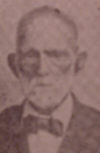|
John L. Miller, Nov. 1877 - 1880
 Probably the most colorful character to be mayor was Major John Miller, who was born in Tennessee in 1821. He married Mary McKinney, a daughter
of Rev. Hampton McKinney, the first settler in Corsicana, had several children children among whom were Lanty, Beaton, and Ursulla. He organized a
company of soldiers for the Mexican War before coming to Corsicana. In 1856 he introduced Sam Houston when he was running for governor and made a speech at the corner of
Beaton and 5th Avenue. Houston said if any man would not vote for him, his wife should pour hot coffee down the back of his neck. Miller was a county judge, local
postmaster in 1859 and a Confederate veteran of the Civil War. He had the nickname of "Old Flax" because one day while hunting wild horses he pursued and captured
a mustang with a flaxen tail. He wrote a column in the local newspaper under the nickname of "Old Flax." He had many readers and organized annual barbecue
picnics each year. He was active in I.O.O.F. and Masonic circles.
Probably the most colorful character to be mayor was Major John Miller, who was born in Tennessee in 1821. He married Mary McKinney, a daughter
of Rev. Hampton McKinney, the first settler in Corsicana, had several children children among whom were Lanty, Beaton, and Ursulla. He organized a
company of soldiers for the Mexican War before coming to Corsicana. In 1856 he introduced Sam Houston when he was running for governor and made a speech at the corner of
Beaton and 5th Avenue. Houston said if any man would not vote for him, his wife should pour hot coffee down the back of his neck. Miller was a county judge, local
postmaster in 1859 and a Confederate veteran of the Civil War. He had the nickname of "Old Flax" because one day while hunting wild horses he pursued and captured
a mustang with a flaxen tail. He wrote a column in the local newspaper under the nickname of "Old Flax." He had many readers and organized annual barbecue
picnics each year. He was active in I.O.O.F. and Masonic circles.His personality can be reflected in a speech he
gave November 20, 1905, at the laying of the cornerstone of the new courthouse: "I landed in Corsicana Sunday evening April 18, 1852. All north and west, including
Corsicana between the Trinity and Brazos to the Rio Grande, was one vast wilderness, full of wild snakes, wild horses, wild cattle, wild buffalo, wild Indians and other wild
varmints too tedious to mention. Corsicana was a little village of about 1,000 inhabitants, of which seven or eight hundred were cattle. I suppose they were
inhabitants, because they slept on the public square every night and left every morning just before day for their range. There was a log courthouse 16 x 17 feet, with
cracks big enough to throw a wolf through.
Judge Bennett H. Martin of Palestine presided, and when the jury deliberated, they went out
under the oak tree to decide the case." During his administration, the Cotton Belt
Railroad came to Corsicana, in 1880. After being mayor he served as County Treasurer. He lived at 521 West Third Avenue, died an old man in 1907. |
Notes:
JOHN L. MILLER, CHIEF JUSTICE, ALSO COUNTY JUDGE, THEN PRESIDING JUSTICE,
From Aug. 1, 1866 to June 1872
The three titles held were the result of Union troop orders. Judge Miller was a unique and widely known old-timer, born in Tennessee in 1821. He organized a company
of soldiers for the Mexican War before coming to Corsicana. He arrived in Corsicana
April 18, 1852, took up residence at Hampton McKinney's Inn and married the proprietor's daughter. He introduced Sam Houston, who was running for governor in 1856.
Houston made a speech at the northwest corner of Beaton Street and Fifth Avenue, telling the audience that if any man would not vote for him, his wife should pour hot coffee down
his neck. He was Corsicana Postmaster in 1859, a Confederate veteran, a lawyer, and
active Mason, a leader in IOOF circles and a writer. One day while hunting wild horses he pursued and captured a mustang with a flaxen tail, so thereafter he signed his
newspaper articles with the penname of "Old Flax." He organized annual barbecue parties which always attracted large crowds. After serving as judge he
continued to hold office as Justice-of-the-Peace, Beat 1, which position had previously qualified him as Presiding Justice of Navarro County. From 1887 to 1880 he was mayor
of Corsicana and later was county treasurer. He lived at 521 West Third Avenue, had several children, among whom were Lanty, Beaton, and Ursulla. He died Aug. 7, 1807,
86 years of age and is buried near the entrance of Oakwood Cemetery, Corsicana, Texas.
Cemetery Marker Dedication Photo

Marking history in Corsicana
James Yarber, Sheriff Les Cotten, City Councilwoman Ruby Williams,
Kevin Steely, Mayor C. L. "Buster" Brown and Municipal Judge James
Lagomarsino, attended the laying of a stone in Oakwood Cemetery
marking the grave of former Corsicana Mayor John L. Miller. Sixteen
former mayors are buried in Oakwood. The intent, using donated
materials and labor, along with some funds from the city, is to mark
each mayor's grave with a stone denoting when they served. Miller
served as mayor from 1877 to 1880. Miller was also a county judge,
local postmaster and veteran of the Civil War. Daily Sun photo/Janet
Jacobs
Corsicana Daily Sun - Feb 13, 2008
|